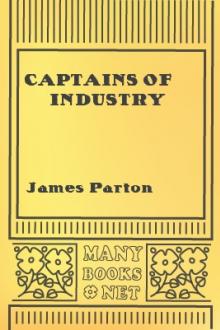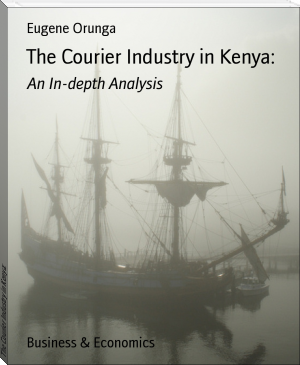Captains of Industry by James Parton (life changing books to read TXT) 📕

- Author: James Parton
- Performer: -
Book online «Captains of Industry by James Parton (life changing books to read TXT) 📕». Author James Parton
"It is a melancholy truth that in the whole course of my life I never arrived at a good market."
On that occasion everything promised well. He had a ship full of valuable goods, and the market to which he was carrying them was in an excellent condition for his purpose, but within twenty-four hours of his port he was captured, and detained ten weeks a prisoner. After the peace of 1815, merchants could send their ships across the ocean without fear of their being taken by English or French cruisers. From that time he had better luck, and gradually gained a moderate fortune, upon which he retired. He never kept a store, or had any sort of warehouse, but made his fortune by sending or taking merchandise from a port which had too much of it to one that was in want of it.
On one of his winter passages to Europe he found the sailors suffering extremely from handling frozen ropes, as they were not provided with mittens. Being a Yankee, and having been brought up to do things as well as read about them, he took one of his thick overcoats and made with his own hands a pair of mittens for every sailor.
On another occasion, in the ship Atahualpa, in 1809, bound to China, the vessel was attacked off Macao by pirates, in twenty-two junks, some of them being twice the tonnage of the vessel. Captain Sturgis, who commanded the vessel, defended her with signal ability and courage, and kept the pirates off for forty minutes, until the vessel gained the protection of the fort. John Bromfield, a passenger on board, took command of a gun, and seconded the endeavors of the captain with such coolness and promptitude as to contribute essentially to the protection of the vessel.
In retirement he lived a quiet life in Boston, unmarried, fond of books, and practicing unusual frugality for a person in liberal circumstances. He had a singular abhorrence of luxury, waste, and ostentation. He often said that the cause of more than half the bankruptcies was spending too much money. Nothing could induce him to accept personal service. He was one of those men who wait upon themselves, light their own fire, reduce their wants to the necessaries of civilized life, and all with a view to a more perfect independence. He would take trouble to oblige others, but could not bear to put any one else to trouble. This love of independence was carried to excess by him, and was a cause of sorrow to his relations and friends.
He was a man of maxims, and one of them was:—
And none but God can tell us who they are."
Another of his favorite couplets was Pope's:—
Lie in three words: health, peace, and competence."
He used to quote Burns's stanza about the desirableness of wealth:—
Nor for a train attendant;
But for the glorious privilege
Of being independent."
He was utterly opposed to the way in which business was then conducted—hazardous enterprises undertaken upon borrowed capital. The excessive credit formerly given was the frequent theme of his reprobation.
How changed the country, even in the short space of sixty years! In 1825 he made a journey from Boston to New Orleans, and his letters show curious glimpses of life and travel as they then were. Leaving Boston at four o'clock on a Friday morning, he reached New York at ten o'clock on Saturday morning, and he speaks of this performance with astonishment. Boston to New York in thirty hours! He was in New York November 4, 1825, when the opening of the Erie Canal was celebrated. He did not care much for the procession.
"There was, however," he adds, "an interesting exhibition of steamboats, probably greater than could be found at any other place in the world; say, from twenty-five to thirty, and most of them of a large class."
He was in the valley of the Ohio that year, and he spoke of it "as the land of cheapness:" flour, two dollars and a quarter a barrel; oats, twelve and a half cents a bushel; corn and rye, twenty cents; coal, three cents. He found all the region from Louisville to Louisiana "one vast wilderness," with scarcely any settlements, and now and then a log hut on the banks, occupied by the people who cut wood for the steamboats. On the prairies of Missouri he rode miles and miles without seeing a house. Indiana was an almost unbroken wilderness: corn ten cents a bushel, a wild turkey twelve and half cents, and other things in proportion.
Nevertheless, travelers at that day had some pleasures which could be advantageously compared with the ease and comfort of the Pullman car. The Alleghanies were then crossed by open wagons drawn by splendid Pennsylvania horses, six in a team, gayly decorated with ribbons, bells, and trappings. He used to repeat, in a peculiarly buoyant and delightful manner, a popular song of the day, called "The Wagoner," suggested by the apparently happy lot of the boys who rode and drove these horses. Some readers may remember the old song, beginning:—
Whose lot I envied most,
What one I thought most lightly tasked
Of man's unnumbered host,
I'd say I'd be a mountain boy
And drive a noble team—wo hoy!
Wo hoy! I'd cry,
And lightly fly
Into my saddle seat;
My rein I'd slack,
My whip I'd crack—
What music is so sweet?
Six blacks I'd drive, of ample chest,
All carrying high their head.
All harnessed tight, and gaily dressed
In winkers tipped with red.
Oh, yes! I'd be a mountain boy,
And such a team I'd drive—wo hoy!
Wo hoy! I'd cry;
The lint should fly.
Wo hoy! Dobbin, Ball.
Their feet should ring,
And I would sing,
I'd sing my fal-de-roll."
We have almost forgotten that such a gay mode of crossing the Alleghanies was ever practiced; and yet a person need not be very old to have enjoyed the experience. I myself, for example, can just remember riding from Buffalo to New York by a line of stages that came round by the Alleghany Mountains, and crossed the State of New Jersey, passing through Morristown. We were just six days in performing the journey.
This excellent man, after a tranquil and happy life, died in 1849, aged seventy, and left considerable sums to benevolent societies. His estate proved to be of about two hundred thousand dollars value, which was then considered very large, and he bestowed something more than half of it upon institutions for mitigating human woe. Ten thousand of it he gave for the promotion of pleasure, and the evidences of his forethought and benevolence are waving and rustling above my head as these lines are written. His memory is green in Newburyport. All the birds and all the lovers, all who walk and all who ride, the gay equestrian and the dusty wayfarer, the old and the invalid who can only look out of the window, all owe his name a blessing.
FREDERICK TUDOR, ICE EXPORTER.Edward Everett used to relate a curious anecdote of the time when he was the American minister at London. He was introduced one day to an Eastern prince, who greeted him with a degree of enthusiasm that was altogether unusual and unexpected. The prince launched into eulogium of the United States, and expressed a particular gratitude for the great benefit conferred upon the East Indies by Mr. Everett's native Massachusetts. The American minister, who was a good deal puzzled by this effusion, ventured at length to ask the prince what special benefit Massachusetts had conferred upon the East Indies, wondering whether it was the missionaries, or the common school system, or Daniel Webster's Bunker Hill oration.
"I refer," said the prince, "to the great quantity of excellent ice which comes to us from Boston."
Mr. Everett bowed with his usual politeness, but was much amused at the excessive gratitude of the prince for the service named.
The founder of this foreign ice business, which has now attained such large proportions, was a Boston merchant named Frederick Tudor, son of that Colonel William Tudor who studied law under John Adams, and who served his country on the staff of General Washington, and afterwards became a judge. Frederick Tudor, who was born in 1783, the year of the peace between England and the United States, entered early into business, being at twenty-two already owner of a vessel trading with the West Indies.
It was in 1805 that the idea of exporting ice first occurred to him—an idea which, as he was accustomed to relate in his old age, was received with derision by the whole town as a "mad project." He had made his calculations too carefully, however, to be disturbed by a little ridicule; and that same year he sent out his first cargo of a hundred and thirty tons, to the Island of Martinique.
The result justified his confidence. The ice arrived in perfect condition, and he was encouraged to follow up his single cargo with many others larger and more profitable. During the war of 1812 business was somewhat interrupted by the English cruisers, which were ever on the alert for prizes in the West Indian waters, but, after peace was declared, his trade increased rapidly. He supplied ice to Charleston and New Orleans also, those cities at first requiring but a ship-load each per annum, although the demand increased so rapidly that a few years later New Orleans alone consumed thirty cargoes.
Almost from the first, Mr. Tudor had believed that ice could be transported as safely and profitably to Calcutta as to Havana; but he could not bring others to share this opinion—at least, not to the point of risking money upon it. It was not, therefore, until 1834, twenty-nine years later than his Martinique experiment, that he sent his first cargo of one hundred and eighty tons of ice to India. Notwithstanding a waste of one third of the whole cargo during the voyage, he was able to sell this Massachusetts ice at one half the price charged for the artificially frozen ice formerly used in Calcutta by the few families who could afford such a luxury.
The cold commodity which he provided met, therefore, with a warm welcome from the English inhabitants. They recognized the boon afforded them, and expressed their gratitude by raising a subscription and presenting to the enterprising Yankee merchant a fire-proof building in which to store his ice. He met them in the same spirit of wise liberality, and sold the article at no more than a reasonable profit—about three cents a pound—which enabled the great body of





Comments (0)